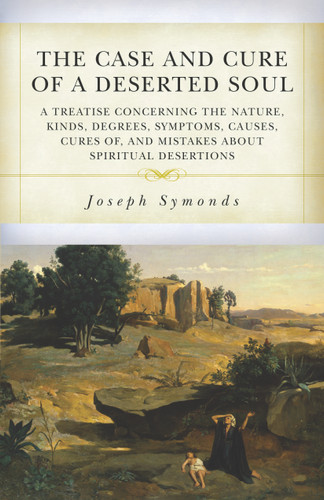
The Case and Cure of a Deserted Soul: A Treatise concerning the Nature, Kinds, Degrees, Symptoms, Causes, Cures of, and Mistakes about Spiritual Desertions (Symonds)
- Affordable shipping (free $100+)
- 100,000+ customers served
- "Wonderful books, great prices, awesome customer service." – Ivan, IL
Description
Have you ever felt like God is far from you? Although God does not abandon any of His children, there are times when believers experience spiritual coldness and distance from God. Acutely aware of this crisis of faith, physician of souls Joseph Symonds helps us understand the nature and reasons for this condition and compassionately delivers the prescription for recovery and prevention of relapse. See for yourself why Symonds’s work is considered the classic Puritan treatment of spiritual depression. It is a resource well worth having.
Contents
Preface
- The godly are sometimes deserted
- How, or in what sense, the godly are said to be deserted
- Four other considerations about desertion
- Of the first sort of desertion: the withholding of assisting grace
- That a man may be deserted and not know it, with the causes and evil of it
- Rules to judge when one is deserted. The first is the consideration of his graces
- When a man is deserted, his light is darkened
- The light and motions of a deserted man do not have the former efficacy to affect, impel, repel, and humble the heart
- When a man is deserted, the mind is more vain and abated in frequency, complacency, and consistency in holy things
- Great incredulity in a deserted soul, with the causes of it
- Of the change and alteration of affections in case of desertion, where is spoken of love, hope, hatred, with their sad abatements
- The second rule to judge of desertion is taken from the increase of sin: where and how the increase of sin may be known
- The third rule to judge in this case is from the consideration of the means of grace
- Causes of desertion: they are for instruction, that nature and grace may be better known, the one in its sinfulness and weakness, the other in its freeness and necessity
- Desertions are for correction, and are caused by pride and carelessness
- We grieve the Spirit by doing Him dishonor
- The second means of grieving the Spirit is disobedience and resistance of the Spirit
- Persuasive considerations to move men to study the preservation of communion with God
- Directions how to retain a divine quickening presence with us. The first two means are to acknowledge it and to use God’s help
- Answers to questions regarding our duty to God
- The third means to retain a divine presence is prayer, in which care must be had of the rise, carriage, and end of it
- The fourth means: keeping the favor of God, with directions how to do it
- The fifth means: keeping in God’s way
- Sixth and seventh means: be doing, and wisely and diligently use the means of grace
- Three counsels to such as are deserted
- Motives to use these counsels taken from possibility of recovery
- Motives to seek recovery taken from necessity
- Two directions how to seek recovery
- Two other directions how to recover
- Of desertions in appearance only, with the causes of mistakes in this case
- The false rules of men’s judging themselves, causing mistakes in this case
- Other false rules causing mistakes in judgment
- The second sort of spiritual desertions: loss of comfort
- The causes and root of comfort
- Of the state and degree of this sad condition
- The effects and consequences of this sad condition
- The causes and cures of this sad condition
Endorsement
“Joseph Symonds’s The Case and Cure of a Deserted Soul is medicine for the soul. With great care and pastoral sensitivity, Symonds explores reasons why someone may be experiencing an overwhelming and unrelenting sense of God’s absence. He guides readers to a place of peace and repose, to a quieted and comforted conscience. There are several good books on this subject, but few are as thorough or as theologically sound as Symonds’s. It should be no surprise that it was popular in England and in the Netherlands; it was even mentioned by Bavinck in his magisterial Ethics. This book should be in the library of every Christian, and not just those who are in the throes of desertion. Reading, thinking through, and applying Symonds’s counsel will not only help us fight spiritual loneliness in our life, but it will also assist in counseling others who long for the light of God’s countenance.”
— Randall J. Pederson, Bible teacher, Zion Christian School; managing editor, Westminster Theological Journal; and coauthor of Meet the Puritans
About the Author
Joseph Symonds (d. 1652) was rector of St. Martin’s, London. He became an Independent and fled to the Netherlands to escape persecution by Archbishop Laud. He pastored an English-speaking congregation in Rotterdam, Netherlands, with William Bridge and Jeremiah Burroughs. He returned to England to become the vice-president and fellow of Eton College.
- Width:
- 5.50 (in)
- Height:
- 8.50 (in)
- Depth:
- 0.96 (in)






